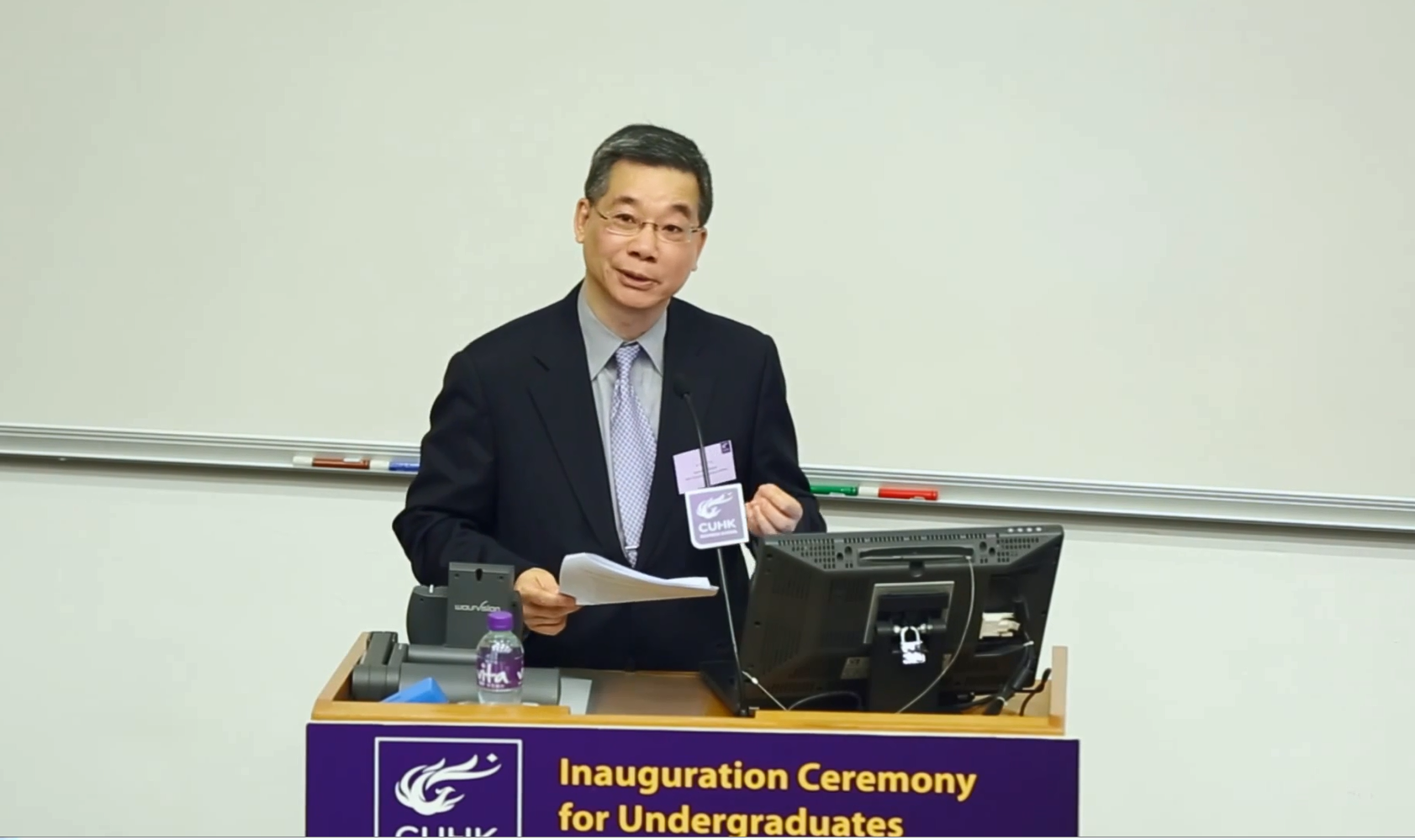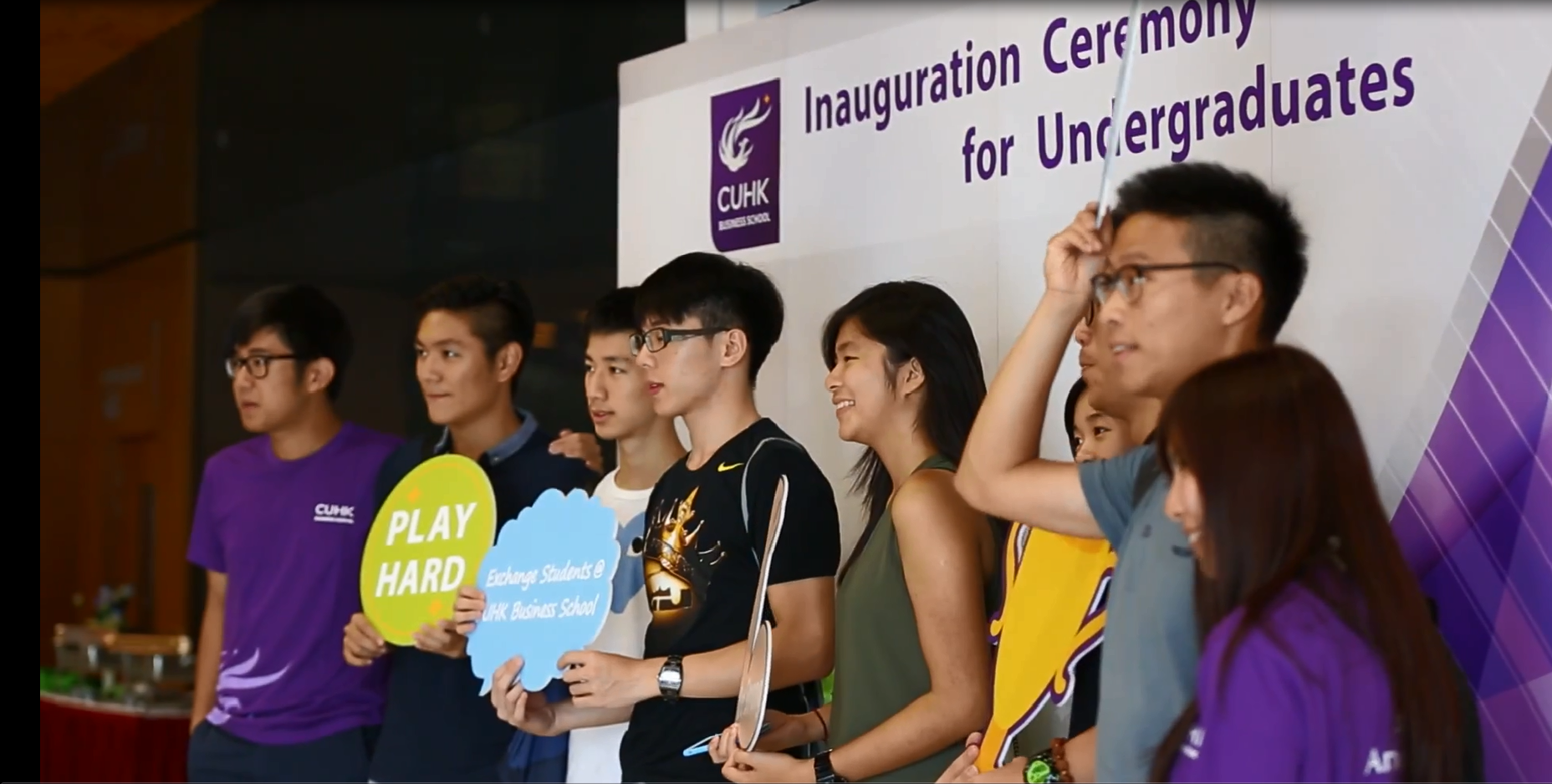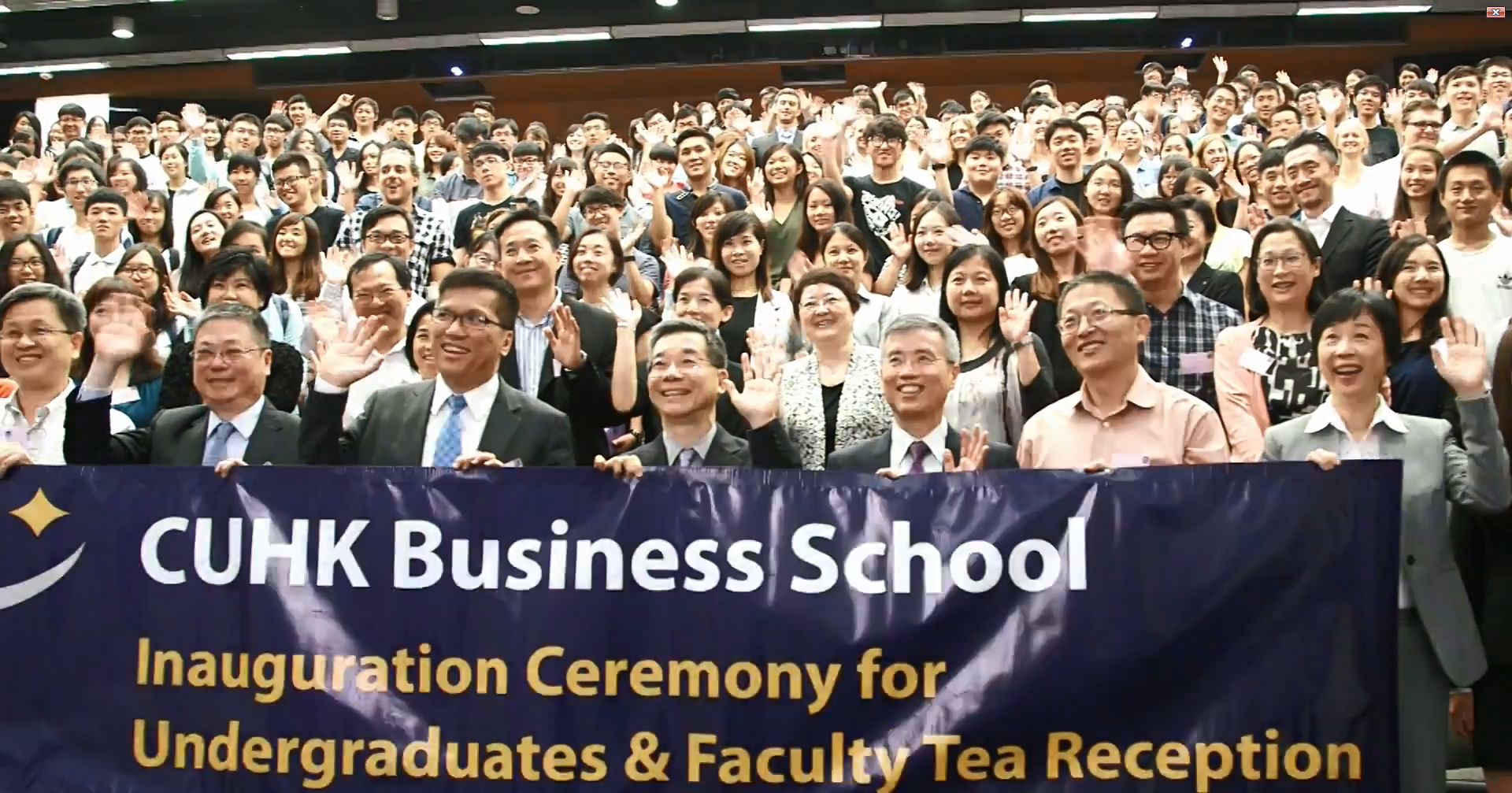Be Prepared for the Disruptions and Opportunities in the Digital Age, CUHK Freshmen Told

The digital age is transforming our society so rapidly that industries, professions and higher education must adapt and transform themselves quickly or else face obsolescence.
This is the message to the new undergraduate class of 2015 at The Chinese University of Hong Kong (CUHK) Business School by Mr. Tony Tai, General Manager of IBM China/Hong Kong Limited. Mr. Tai was the honourable speaker at the inauguration ceremony for the new school term on September 7, 2015.
As the recipient of the CUHK Beta Gamma Sigma Chapter Honouree of 2015, Mr. Tai said he was honored to be connected to the best in industry through this award. At the same time, he was excited about being connected to the future leaders of the society and business through addressing the incoming freshmen of the CUHK Business School.
Forces of Disruptive Innovations
To prepare for the unprecedentedly fast pace of change in today’s society was the main crux of Mr. Tai’s speech. He started by pointing out a number of major forces of change, which he called “disruptive innovations.”
The first force of disruptive innovation is the power of mobile communications. “It is a truly ‘mobile-first’ world,” Mr. Tai said. “Over 10 times more smart phones or tablets are being sold than babies are being born. On average, people check their smart phones 150 times a day, or nearly every six seconds.”
The second force is social media. Mr. Tai pointed out that Facebook has 1.49 billion monthly active users and is still growing at 13 percent year-to-year, which is bigger than China’s population of 1.36 billion at the end of 2014. In addition, more than 2.5 trillion bytes of data―known as big data―are created every day. These include videos, images and daily updates on social media.
The third force is analytics and cognitive computing. Mr. Tai described cognitive computing as a computer system that learns, thinks and performs a specific task after being trained. To illustrate how such a computer system works, he compared human beings with traditional machines and cognitive computing. “We all process data, but we can only deal with a limited amount of information. We get physical or mental fatigue, and we do make mistakes. Traditional machines can’t handle ambiguity, they are pre-programmed and rigid, and do not interact by natural means. But cognitive computers understand natural language and interact naturally. Eventually, they can help with decision making and enhance the quality and consistency in decision making.”
“These, together with robots and 3D printing, are changing our lives, our society, the industries and professions as well. They are also spurring disruptive innovations that span across the economy,” said Mr. Tai.
The Transforming Society
“In the old days, a lot of things were controlled by corporations and pushed to the consumers,” he continued. “Today, we have an individual-centric economy. You can have content delivered your way, and access it anytime, anywhere. You can always send feedback on what you like and what you don’t like.”
He drew a number of examples to illustrate the transformations in society brought along by technological innovations, including the entertainment, healthcare, manufacturing, marketing and writing profession.
The traditional entertainment industry, for example, has changed a lot. Consumers have moved from CDs and MP3s to streaming services, such as Spotify.
In healthcare, people used to rely on individual doctors to make judgments. Today, a cognitive computer called IBM Watson is helping 14 U.S. and Canadian cancer institutes with cancer treatment. Having gathered all available scientific papers and clinical trials on particular cancers and potential therapies over the past four years, Watson can identify drugs targeting cancer-causing mutations in minutes while it took weeks before. This enables the industry to move toward the “precision medicine” model.
In manufacturing, 3D printing is making it possible to produce goods at a relatively low cost and rapid speed-to-market, with the designs tailored to personal needs. For example, consumers are now able to design their own tailor-made cars through 3D printing technology. The world’s first batch of 3D-printed cars is expected to be delivered in the first quarter of 2016. This will have a big impact on car production, accelerating changes in the industry.
The marketing profession is undergoing a data-driven marketing transformation. This involves collecting customer data from online and offline interactions and social networks, applying analytics to understand the customers, and then design and roll out precise, personalized marketing offers to them. “The new generation of marketing professionals should be data-savvy,” Mr. Tai said, citing a game retailer who has found that it only has 3 seconds to captivate a customer from the time he enters the shop by identifying his consumption pattern and building a perfect video to promote a game specifically targeted at him.
Another profession undergoing great transformation is the writing profession. Writers’ core skill set has always been to gather and synthesize information to create stories that are relevant to a particular audience. In the US, two companies―Automated Insights and Narrative Science ― are using algorithms to gather and synthesize information, and natural language generators to create articles for the Associated Press and Forbes. These articles are generated by “robo-writers,” and the resulting articles they write―mostly on sports and finance―are virtually indistinguishable from those written by humans. Robots have even written a novel, titled “TrueLove,” which was published in 2008 in Russia. “So writers need to consider how they can differentiate themselves from the robots,” he said.
The ‘People Challenge’
With all these changes, the old strategy of making enhancement on existing products or services, or so-called “sustaining innovations,” is no longer adequate. Professions and industries must quickly reinvent themselves to keep up with the pace of the “disruptive innovations” or they may risk becoming obsolete.
Mr. Tai pointed out that the average job tenure for the CEOs in Fortune 500 companies in 2000 was 10 years, but today, it has been reduced to only five years. “So CEOs, if you are not fast enough to change, you’re going to have to find another job.”
According to a survey of more than 900 academic and business leaders around the world, conducted by IBM in collaboration with Economist Intelligence Unit, the speed of technological innovation and industry demands is moving so fast that there are now shortfalls in students’ skill sets that are required for them to succeed in the workplace. Mr. Tai delineated these skills as:
the ability to analyze problems and draw out possible solutions;
the ability to collaborate effectively and work in teams;
the ability to communicate effectively in business context; and
the willingness to be flexible, agile and adaptable to change.
“I hope that after you graduate, you will be able to enhance on these four areas,” said Mr. Tai.
To Think and Respect
To wrap up his speech, Mr. Tai shared with the students the two key values that he has learned throughout his career at IBM.
“Think” is the basis and foundational belief of the 104-year-old company, he said, citing IBM founder Thomas J. Watson Sr. who said, “The trouble with every one of us is that we don’t think enough. Knowledge is the result of thought, and thought is the keynote of success in this business or any business.”
Mr. Tai stressed that the “think” model is even more important nowadays, because “in a connected and fast-moving world, in which we are overwhelmed by oceans of information today, we must think, think again and again, and go out to try and practice what we think is the right thing.”
The second important value that he shared with the students is “respect for the individual.” “This value is all the more valid in the most interconnected world today. People of different origins, nations, cultures and religions are all connected via the Internet, through mobile phones and through social networks. We can only communicate and collaborate effectively when we hold respect for each other.”
In conclusion, Mr. Tai offered the young audience a heartfelt advice: “The future of Hong Kong, whether it be the most competitive or the most desirable city to live in, depends on its people. It is the people who make the difference. Being elite youngsters, you will be the leaders of the Hong Kong society. I encourage you to go out to understand more about the community and the business world, and to think about how to make Hong Kong a better place, a better society for ourselves and the next generation.”
By W.S. Yau



